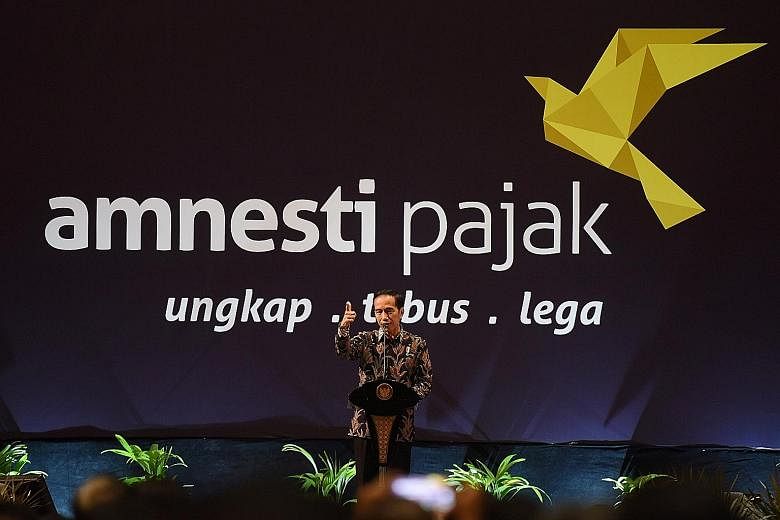Indonesian Finance Minister Sri Mulyani Indrawati has issued a warning for tax evaders to come clean as the country prepares to take part in a global information exchange on tax matters next year.
Her comments at the Group of 20 meeting in Germany over the weekend also come as Indonesia's tax amnesty draws to a close, with more than 800,000 people having declared more than 4,500 trillion rupiah (S$473 billion) in assets, both at home and from overseas.
While this exceeded the 4,000 trillion rupiah target for assets declared, only 145 trillion rupiah out of 3,396 trillion rupiah worth of assets overseas were repatriated.
With only a fraction of Indonesians paying tax, President Joko Widodo is pushing for major tax reforms, with the higher revenues going to fund infrastructure spending, drive growth and beef up a flagging state budget.
"The tax amnesty results showed that while assets declared were very high, the assets repatriated remained relatively low," said Dr Sri Mulyani. "So cooperation in exchange of information is critical... there will no longer be safe havens for tax evaders in the world."
She was referring to Indonesia's move to adhere to the standard of Automatic Exchange of Information on tax matters, developed by the Organisation for Economic Cooperation and Development, come 2018. And to boost tax collection, she has also set up a special tax reform team.
So far, the taxman has collected only 107 trillion rupiah, or 64 per cent of the 165 trillion rupiah in tax revenue Jakarta had hoped to raise under the amnesty, according to latest figures from the tax office.
The government had hoped to see 1,000 trillion rupiah repatriated from overseas and subsequently invested locally.
But with the scheme ending on March 31, observers said this is as good as it gets for the tax authorities. Analysts The Straits Times spoke to pointed to how the needle had barely moved since last September, when the first three-month phase of the amnesty ended.
At the time, tax authorities had already collected 97 trillion rupiah in revenue while taxpayers had repatriated 135 trillion rupiah in assets from overseas to take advantage of the low tax rate being offered then.
Under the amnesty, individuals enjoy preferential tax rates ranging from 2 per cent to 10 per cent, depending on when they declare, and whether the funds are repatriated.
This means tax rates in the first phase, which started last July, were the lowest, while those in the third and final phase, ending this month, are the highest. As such, observers do not expect a late surge in asset declarations or repatriations.
Still, Indonesia has fared much better than many other jurisdictions such as Australia, Chile, Ireland, Italy, South Africa and Spain, which had introduced similar tax amnesties between 1993 and 2015, said economists.
"More than 100 trillion rupiah of additional revenue is quite decent," said Maybank Indonesia economist Myrdal Gunarto.
He added that the nation now has a wider base of taxpayers - many of whom would have not been on its books had it not been for the amnesty. "And the declared assets would now be a new source of recurring income for the government."
Government sources have told ST that a longer-term goal for the amnesty was to consolidate information on assets owned by Indonesians at home and abroad, as well as other data, which can be used as a foundation for tax reforms.
Experts said about a 10th of Indonesians are registered taxpayers.
Of these, fewer than a million file returns, due to the country's notoriously loose tax regime.

